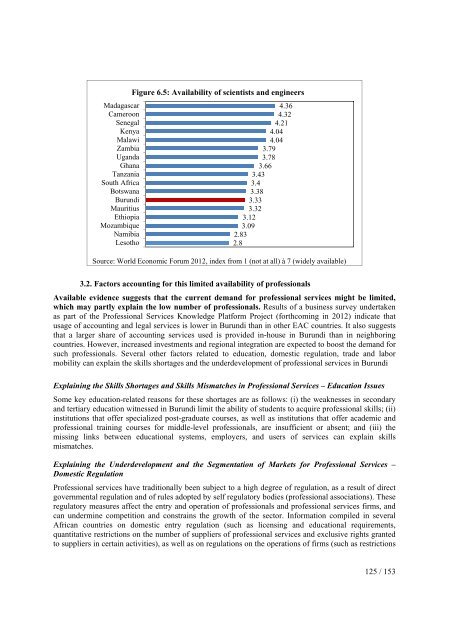(DTIS) Update, Volume 1 â Main report - Enhanced Integrated ...
(DTIS) Update, Volume 1 â Main report - Enhanced Integrated ...
(DTIS) Update, Volume 1 â Main report - Enhanced Integrated ...
Create successful ePaper yourself
Turn your PDF publications into a flip-book with our unique Google optimized e-Paper software.
MadagascarCameroonSenegalKenyaMalawiZambiaUgandaGhanaTanzaniaSouth AfricaBotswanaBurundiMauritiusEthiopiaMozambiqueNamibiaLesothoFigure 6.5: Availability of scientists and engineers4.364.324.214.044.043.793.783.663.433.43.383.333.323.123.092.832.8Source: World Economic Forum 2012, index from 1 (not at all) à 7 (widely available)3.2. Factors accounting for this limited availability of professionalsAvailable evidence suggests that the current demand for professional services might be limited,which may partly explain the low number of professionals. Results of a business survey undertakenas part of the Professional Services Knowledge Platform Project (forthcoming in 2012) indicate thatusage of accounting and legal services is lower in Burundi than in other EAC countries. It also suggeststhat a larger share of accounting services used is provided in-house in Burundi than in neighboringcountries. However, increased investments and regional integration are expected to boost the demand forsuch professionals. Several other factors related to education, domestic regulation, trade and labormobility can explain the skills shortages and the underdevelopment of professional services in BurundiExplaining the Skills Shortages and Skills Mismatches in Professional Services – Education IssuesSome key education-related reasons for these shortages are as follows: (i) the weaknesses in secondaryand tertiary education witnessed in Burundi limit the ability of students to acquire professional skills; (ii)institutions that offer specialized post-graduate courses, as well as institutions that offer academic andprofessional training courses for middle-level professionals, are insufficient or absent; and (iii) themissing links between educational systems, employers, and users of services can explain skillsmismatches.Explaining the Underdevelopment and the Segmentation of Markets for Professional Services –Domestic RegulationProfessional services have traditionally been subject to a high degree of regulation, as a result of directgovernmental regulation and of rules adopted by self regulatory bodies (professional associations). Theseregulatory measures affect the entry and operation of professionals and professional services firms, andcan undermine competition and constrains the growth of the sector. Information compiled in severalAfrican countries on domestic entry regulation (such as licensing and educational requirements,quantitative restrictions on the number of suppliers of professional services and exclusive rights grantedto suppliers in certain activities), as well as on regulations on the operations of firms (such as restrictions125 / 153
















